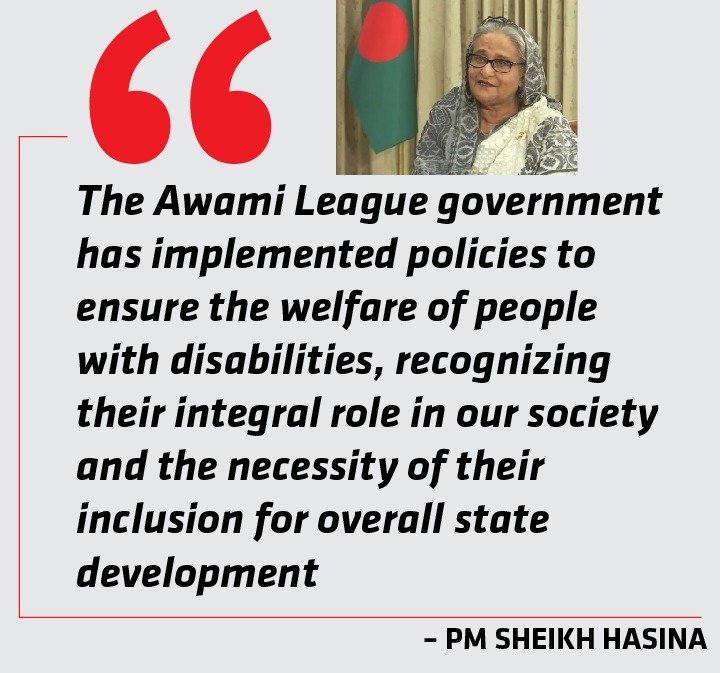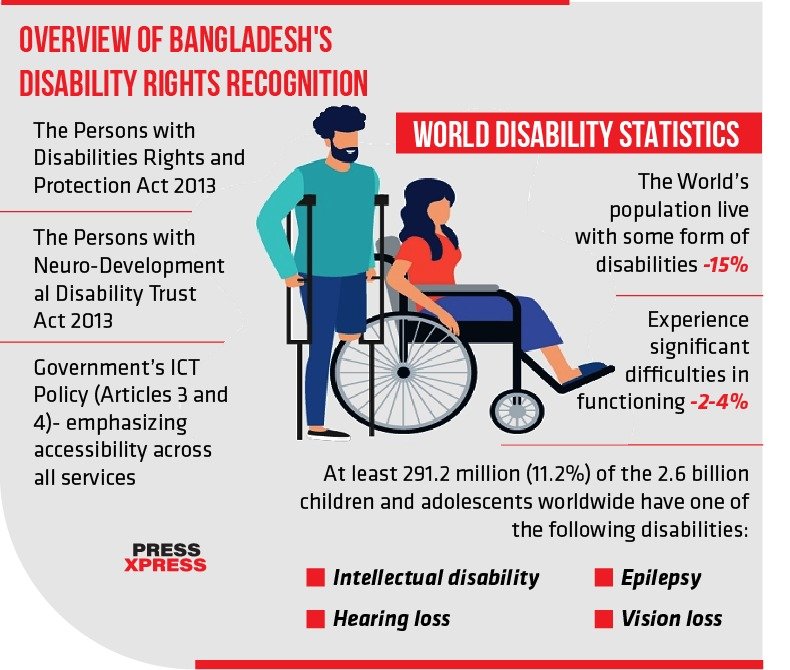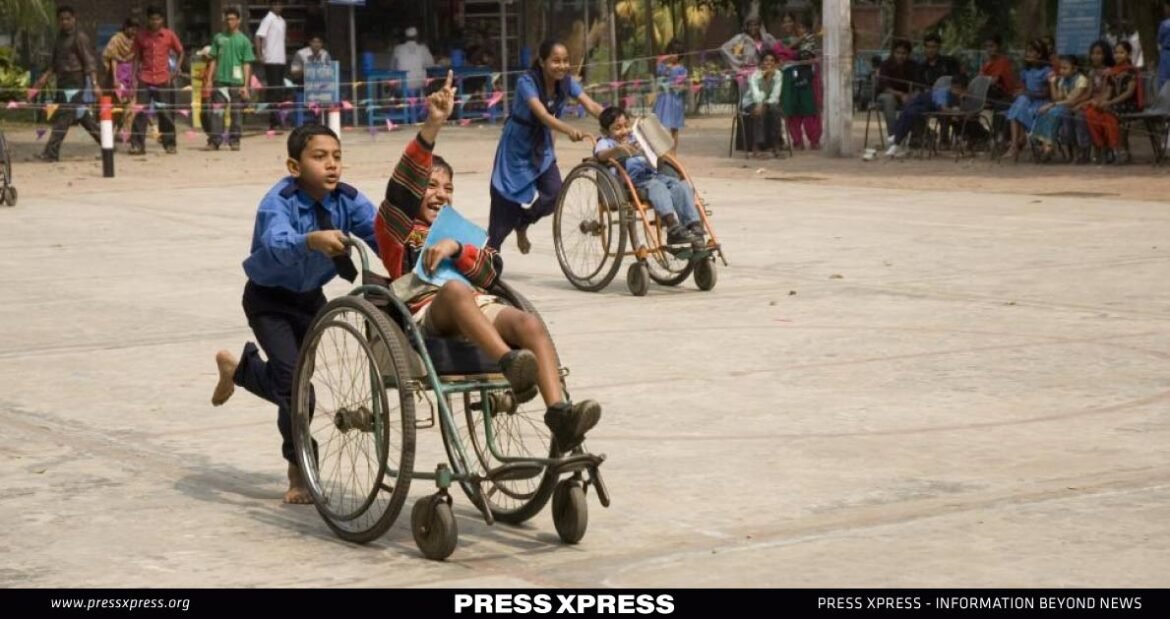Through continued commitment, collaboration, and a focus on leveraging technology for inclusivity, Bangladesh can strive to build a future where every citizen, regardless of ability, can thrive and contribute meaningfully to the nation’s progress toward a disability-inclusive Smart Bangladesh
International Day of Persons with Disabilities is observed worldwide on 3rd December 2023 (Sunday) with a commitment to improve and protect the lives of people with physical and mental disabilities. In tune with the world, the country has celebrated the 25th National Day of Persons with Disabilities this year. This year’s theme was ‘Ensuring Inclusive Participation of Persons with Disabilities, Achieving SDGs’. In the observance of the Day in Bangladesh, various entities, such as the Ministry of Social Welfare, were actively engaged, underscoring the nation’s dedication to inclusiveness. A wave of change is sweeping across the nation as it actively participates in the celebration of the International Day for Persons with Disabilities.

Based on the Household Survey of 2016 conducted by the Bangladesh Bureau of Statistics, it was reported that approximately 6.94% of the total population in Bangladesh faces some form of disability. The recent ‘National Survey on Persons with Disabilities (NSPD) 2021’ reveals that about 2.80% (roughly 47.42 lakh individuals) have at least one disability, with 3.29% among males and 2.34% among females. Additionally, the survey highlights disability rates of 2.92% in rural areas and 2.45% in urban areas.
As per the World Health Organization (WHO), the estimated percentage of citizens with disabilities in Bangladesh is in the range of 10-15%. These statistics underscore the intricate nature of the demographic challenge, emphasizing the need to ensure that technological advancements do not inadvertently exclude a significant segment of the population.
Overview of Bangladesh’s Disability Rights Recognition
Bangladesh has gained international recognition for its proactive stance on disability rights, evident in its early endorsement and approval of the UN Convention on the Rights of Persons with Disabilities (UNCRPD) — making it one of the initial 20 nations worldwide to do so. Aligning with the UNCRPD, the government enacted the “Persons with Disabilities Rights and Protection Act, 2013” to safeguard the rights and holistic progress of individuals with disabilities in Bangladesh, addressing digital inclusion and accessibility in a dedicated section.

As per the constitution of Bangladesh, every citizen possesses the right to uphold their dignity, fundamental human rights, and social equality. To cater to the needs of the most vulnerable citizens with neurodevelopmental disabilities, including autism spectrum disorders, the Persons with Neuro-Developmental Disability Trust Act 2013 was instituted.
Furthermore, the Bangladeshi government has actively incorporated disability concerns into its National Education Policy, National Skills Development Policy, and overarching policy frameworks like Vision 2041, the 8th 5-Year Plan, and the Delta Plan of Bangladesh. The National Action Plan on Disability and the Government’s Information and Communication Technology (ICT) Policy (Articles 3 and 4) have also embraced the cause of accessibility for persons with disabilities across all government and private services, ensuring the protection of their rights.
The significance of accessibility extends beyond national commitments, assuming global importance. Article – 9 of the UNCRPD mandates equal access to information and communication technology-related services for persons with disabilities, akin to other citizens, while Article – 21 encourages presenting internet information in a manner inclusive of disabilities. Moreover, the United Nations Sustainable Development Goals (SDG) emphasize integrated service delivery, promoting disability-inclusive services to attain SDG targets and embody the principle of “Leaving No One Behind.”
Ongoing Challenges and Government Commitments
Despite progress in legislation and societal attitudes, challenges persist, emphasizing the ongoing need for concerted efforts. Issues such as accessible infrastructure, employment opportunities, and healthcare accessibility remain at the forefront of the agenda. The celebration of this day serves as a platform to advocate for positive change, encouraging policymakers, businesses, and communities to work collaboratively toward a more inclusive future.
The government of Bangladesh, recognizing the importance of inclusivity, has made substantial commitments to advance disability rights and inclusion. The upcoming elections provide an opportunity for all political parties to include disability issues in their manifestos. These must include pledges to enhance accessibility in public spaces, make infrastructure, transportation, and government services more inclusive and accommodating, prioritizing inclusive education, foster employability opportunities, and developing the utilization of assistive technology.
Bangladeshis with disabilities hold high expectations, hoping for the effective implementation of existing laws, policy coherence, and meaningful representation in the decision-making process. As the government strides towards creating a more inclusive society, the disability community remains optimistic that these commitments will translate into transformative actions, fostering a Bangladesh where every citizen, irrespective of ability, can lead a dignified and fulfilling life.
World Disability Statistics
World Health Organisation (WHO) reported that 15% of the world’s population live with some form of disabilities, with 2-4% experiencing significant difficulties in functioning.
The Global Burden of Disease Study 2017 data revealed that at least 291.2 million (11.2%) of the 2.6 billion children and adolescents worldwide under 20 years old were estimated to have 1 of the 4 specified disabilities, namely intellectual disability, epilepsy, hearing loss, and vision loss. The study acknowledged that the data analyzed did not include the full range of childhood disabilities or childhood functional difficulties.
1 in 4 (26%) adults in the United States live with a disability.
Conclusion:
Bangladesh is not only celebrating achievements but also reflecting on the journey ahead. Through continued commitment, collaboration, and a focus on leveraging technology for inclusivity, Bangladesh can strive to build a future where every citizen, regardless of ability, can thrive and contribute meaningfully to the nation’s progress towards a disability-inclusive Smart Bangladesh. The wave of progress is sweeping across the


